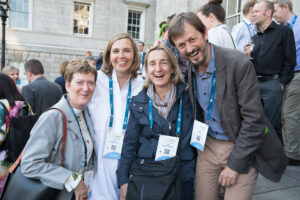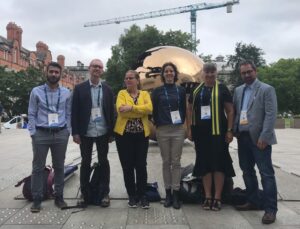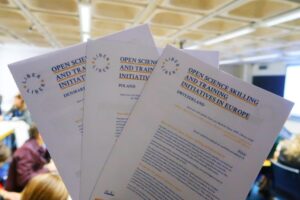LIBER Strategy Update: 2019 Year In Review
With 2020 just around the corner, we want to reflect on the achievements of this year and highlight what we’ll deliver in the months ahead.
In 2019, we fulfilled our mission of enabling world-class research and worked towards our strategic goal of Powering Sustainable Knowledge in the Digital Age in many ways.
We celebrated in April when — after years of strong campaigning by LIBER — the European Parliament adopted a new Copyright Directive including a Text and Data Mining (TDM) exception for research. Improvements to help libraries with digital preservation and mass digitization were also included in the new Directive.
Throughout the year, we shared knowledge in a variety of formats. We released a steady stream of reports and case studies, workshops and webinars — many created by our energetic Working Groups — and published 20 articles in LIBER Quarterly, our Open Access Journal.
We promoted the research library perspective far and wide: by joining discussions on Plan S and the European Open Science Cloud, by connecting our libraries and working groups with international projects and by representing research libraries on the governance boards of other organisations such as Europeana and SCOSS.
As a network, nearly 500 of us came together in Dublin for our 48th Annual Conference — both to hear the latest updates and insights and to overwhelmingly approve an ambitious plan to keep LIBER strong and stable.
Backed by your trust, we are hard at work on the new and expanded activities and services requested by our network: the first of which will launch in early 2020.

We hope you enjoy reading our 2019 review. It shines a spotlight on LIBER’s many efforts during the year, all of which were made possible by your support.
To our 451 Participants, fellow library organisations, global partners and sponsors: thank you for your collaborative spirit, your commitment to the network and your belief in our work to represent and strengthen research libraries across Europe. We are looking forward to 2020!
Network Growth
Fourteen institutions joined LIBER in 2019, for a total of 451 Participants (up from 440 in 2018) from 40 countries.
Center for Research and Restoration of Museums of France – Edition Diffusion Press Services – Hasselt University Library – Hungarian Central Statistical Office Library – Le Mans University Library – Luke Wadding Library – Max Planck Institute Luxembourg for International, European and Regulatory Procedural Law – School of Economic and Business LU, Central Economics Library – Siegen University Library – Springer Nature – The Library of the Finnish Literature Society – The Research Library Dubrovnik – University of Rennes 1 Academic Library – University of Strathclyde Library
New Working Groups & Projects
The Citizen Science and Federated Identity Management for Libraries (FIM4L) Working Groups launched, making 11 Working Groups in total.
We also started roles in two international projects. INOS will modernise Higher Education Institutions curricula and skills through civic engagement in open and citizen science. Our work in INOS links to our Citizen Science Working Group.
SSHOC is building the Social Sciences and Humanities component of the European Open Science Cloud (EOSC). Through SSHOC we connect to our Digital Humanities and Digital Skills groups.
In January, we will begin on a third project: reCreating Europe. It will rethink digital copyright law for a culturally diverse, accessible and creative Europe, and our libraries will be invited to participate in the many engagement activities.
We work alongside LIBER libraries in all projects and two LIBER Participants sit on the INOS advisory board.
Dedicated Volunteers
190 people made LIBER stronger in 2019 by joining a Working Group, serving on the Executive Board, participating in the Conference Programme Committee and on the editorial board of LIBER Quarterly. The number of LIBER volunteers rose 12% in 2019.
Achievements
All of our efforts — from Working Groups and project activities to partnerships and events — are guided by our 2018-2022 Strategy, and its three pillars: Innovative Scholarly Communications, Digital Skills & Services and Research Infrastructures.
Strengthening Our Foundation
In 2019, LIBER Participants approved an ambitious plan to keep LIBER strong and stable. Following this vote of confidence, we immediately began working on the extra training, events and resources requested by our institutions.
The dates of our new mid-term event are already set (3-4 December 2020, Amsterdam). Together with our Working Groups and projects, we are planning more webinars. Within the LIBER Office, we’ve outlined plans for a database, to which our libraries will be invited to add their skills and project ambitions. This database will launch in 2020, paving the way for better connections between our libraries and projects.
Our Office team will grow next year. Two new staff members are being recruited. They will bring important training and events management skills in-house.
Collaborating for Change
From an advocacy perspective, we had a huge win early in 2019: the inclusion of a Text and Data Mining (TDM) exception for research in Europe’s new Copyright Directive, plus improvements to help libraries with digital preservation and mass digitization.
This new library-friendly legislation was the result of sustained advocacy work, carried out in close collaboration with many like-minded institutions. Together we are stronger and throughout the year we joined forces with European and global partners to boost the voice of research libraries.
Copyright Guidance. We created detailed copyright implementation guidance for libraries and library associations in cooperation with EBLIDA, IFLA and SPARC Europe. More guidance from LIBER and Communia is coming shortly.
International Projects. We shared the expertise and needs of research libraries in the FOSTER Plus, EOSCpilot, INOS and SSHOC projects. We frequently brought our libraries, working groups and projects together for joint webinars, workshops and presentations.
Library Manifesto. With EBLIDA, IFLA, SPARC Europe and Public Libraries 2030 we endorsed a Library Manifesto for Europe.
Plan S. We issued a joint view on Plan S with ARL, CARL, CAUL and RLUK, under the umbrella of IARLA (International Association of Research Library Associations).
Representation. We represented Europe’s research libraries on the boards of Europeana, SCOSS, SPARC Europe and Think. Check. Submit.
Sustainable Funding. We backed the SCOSS call for sustainable funding for vital Open Access and Open Science infrastructures.
Training Community. We joined OpenAIRE’s Community of Practice (CoP) for training coordinators and managers. The CoP regularly discusses making training FAIR, especially regarding training within the EOSC. Shared activities took place during the OSFAIR2019 and the EOSC Symposium.
Providing Training
We worked with our libraries, international projects and partners to offer many training opportunities for research library staff.
Data Science. A Library Carpentry train-the-trainer event was attended by 16 people from 13 LIBER institutions, as a satellite event to LIBER 2019.
European Open Science Cloud. As part of our work to foster communities, empower users and build expertise, we contributed to the launch of the SSHOC Training Community. Libraries, as EOSC intermediaries and trainers, can join to access training materials, connect with other trainers and volunteer to host a SSHOC workshop. We highlighted the EOSC training expertise of SSHOC and LIBER through presentations, posters and interactive sessions at the EOSC Symposium, OS FAIR 2019 and 14th RDA Plenary. A webinar about ethics and skills in the EOSC as part of our role in the EOSCpilot project. We also collaborated on the Sustainable Development of Skills and Capabilities Strategy for EOSC and the FAIR4S framework through EOSCpilot.
Leadership. Twenty-seven senior library professionals signed up for the fifth edition of our Emerging Leaders programme and plans were made for the 2020 edition of the Journées programme for library directors.
Open Science. LIBER collaborated with Scientific Knowledge Services on 11 Open Science Workshops. Through FOSTER Plus we contributed to Open Science training in cities across Europe. We also participated in an Open Science and Research Data Management bootcamp and the Barcamp Open Science. Speakers from FOSTER and Stockholm University Library ran a webinar on inspiring cultural change towards Open Science. Training strategies and lessons learnt from FOSTER were summed up in LIBER Quarterly.
Webinars. Thirteen webinars attracted over 2,000 registrations from librarians, researchers, politicians and other stakeholders.
Cooperating through Working Groups
Our Working Groups carried out many activities — often in tandem with our libraries, projects and partners.
Innovative Scholarly Communications
Citizen Science. After being formed in March, the Citizen Science group immediately started raising awareness with a journal article Citizen Science & Libraries: Waltzing Towards Collaboration, a LIBER 2019 workshop and presentations at the Focus On Open Science workshop series.
Copyright & Legal Matters. The Copyright & Legal Matters group played a key role in securing a TDM Copyright Exception for research, and followed up with extensive copyright guidance in the form of a plain-language guide to advocating for libraries and research, briefing documents, a checklist for the mass digitisation of out-of-commerce works, transposition guidance and a webinar series.
Innovative Metrics. After publishing Scholarly Metrics Recommendations for Research Libraries in 2018, the Metrics group moved to an in-depth examination of six key topics, as explained in their mid-year update. The group also ran a webinar on Innovating The Ways Metrics Are Applied, Responsible Metrics & Measuring Openness, presented their work at international conferences, organized a workshop “Where to From Now On” at LIBER 2019 and began cooperating with the INORMS research evaluation Working Group.2

Members of the Innovative Metrics group at LIBER 2019.
Open Access. A survey on Open Access Monographs in European Research Libraries was a major undertaking of the Open Access group. The best-practices, opportunities and challenges highlighted in the survey were discussed in a LIBER 2019 workshop, and at a series of conferences. The group also engaged on international initiatives and topics, including:
- Plan S — Two statements released: from LIBER and from global research library associations;
- SCOSS — Working group member Paul Johnson appointed to the advisory board, in addition to the role of Giannis Tsakonas on the main SCOSS board;
- Think.Check.Submit — Continued work to develop more tools for librarians and guidelines for books.
Digital Skills & Services
Digital Humanities & Digital Cultural Heritage. The DH & DCH group concluded their first year of work by publishing a Europe-wide landscape study on digital humanities and collections within LIBER libraries. They ran a LIBER 2019 workshop with SSHOC and the Digital Skills group, and collaborated with global colleagues to write a book on Opening A GLAM Lab. Going forward, the group will concentrate on the themes of Digital Collections, Impact, Prov(id)ing Expertise and Building Relationships — as outlined in their 2019-2021 Workplan.
Digital Skills for Library Staff & Researchers. Open Science skills for research librarians and researchers are at the heart of the evolution towards openness. To support this transition, the Digital Skills group released Open Science Skilling and Training case studies, ran a workshop on Open Science Essentials with SSHOC and initiated a list of Open Science training resources and required digital skills.

Seven Open Science Skilling and Training case studies were released by the Digital Skills group, and more are coming in 2020.
Leadership Programmes. Twenty-seven senior library professionals were welcomed to the fifth Emerging Leaders programme in 2019, which the Leadership group organises. Work also began on the 2020 edition of the LIBER Journées in Budapest, Hungary, and the Job Description Repository was expanded.
Research Infrastructure
Architecture. The Architecture group has a long history within LIBER and shows no sign of slowing down. In 2019 they started work on a revised version of the Library Buildings in Europe database (to be made live in 2020) and will hold their 20th Architecture Seminar in April in Luxembourg.
FIM4L. The FIM4L group launched in the autumn with three key priorities to help libraries with federated authentication: 1) to come to a consensus on library policy for federated authentication that protects users identities 2) to seek broad support for the policy amongst libraries and publishers and 3) to promote the use of uniform implementations of authentication procedures by service providers. LIBER library staff with an interest in federated authentication are invited to join the group. The FIM4L group was born out of work and discussions which occured as part of our participation in the AARC2 project.
Linked Open Data. A survey was conducted by the Linked Open Data group, in order to gain a picture of the current state of linked open data among European libraries. This survey — the results of which will form the basis of best-practices recommendations to be released by the group in 2020 — is now being analysed and will be released this year.
Research Data Management. In 2019, the Research Data Management group reported on the FAIRness of Repositories and their Data, led webinars on research data, data curation and library carpentry, published case studies on RDM support and extended its Data Management Plan Catalogue. A workshop on Applying the FAIR Data Principles in Day-to-Day Library Practice was also run at LIBER 2019.
Coming Up
Ten Things To Watch For In 2020
- ANNUAL CONFERENCE — Our 49th Annual Conference is in Belgrade from 24-26th June. The Call for Papers is open!
- MID-TERM EVENT — Save the date. On 3-4 December we’ll launch a brand new network event at the VU University in Amsterdam. We’re working on a programme with dynamic and innovative sessions.
- LEADERSHIP DEVELOPMENT — Library directors are invited to the LIBER Journées leadership seminar, 13-15 May in Budapest. The theme will be Leading Libraries in a world of Openness and applications will open in December.
- ARCHITECTURE SEMINAR — Building or renovating your library? Join the Architecture group‘s 20th seminar on Designing for Learning and Scholarship in Luxembourg on 1-3 April.
- PROJECT & CONFERENCE WORKSHOPS — Watch for LIBER 2020 workshops plus hackathons, bootcamps and training events from the INOS, SSHOC and reCreating Europe projects.
- FOCUS ON OPEN SCIENCE – The Focus on Open Science series will continue in collaboration with LIBER. Events in Turkey, Austria, the United Kingdom and Hungary are already planned.
- REPORTS & GUIDES — A Librarian’s Guide to Citizen Science is due to be released, as are reports from our Digital Skills and Innovative Metrics groups, plus feature stories on libraries working with Open Access.
- WEBINARS — We’ll feature insights from Working Groups, international projects and guest speakers. Keep tabs on all webinars by watching this page or by signing up for webinar alerts.
- PROJECTS DATABASE — As promised in our Proposal to LIBER Participants, we will invite libraries to add their skills and project ambitions to a database. This will help us better identify opportunities to involve LIBER libraries in projects, based on their profiles.
- REVISED WEBSITES — An updated version of the Library Buildings in Europe database will go live in the spring, followed by improvements to the main LIBER website later in 2020.
Want to stay updated? Get LIBER Alerts delivered to your inbox and follow us on Twitter, LinkedIn and Facebook.
Related news articles